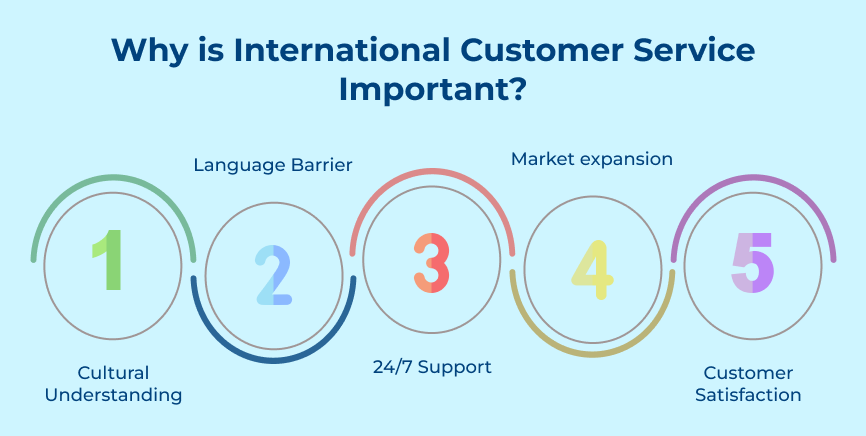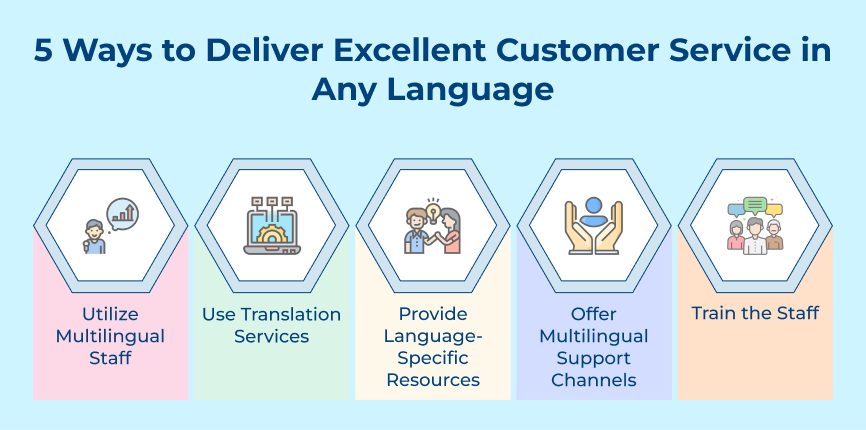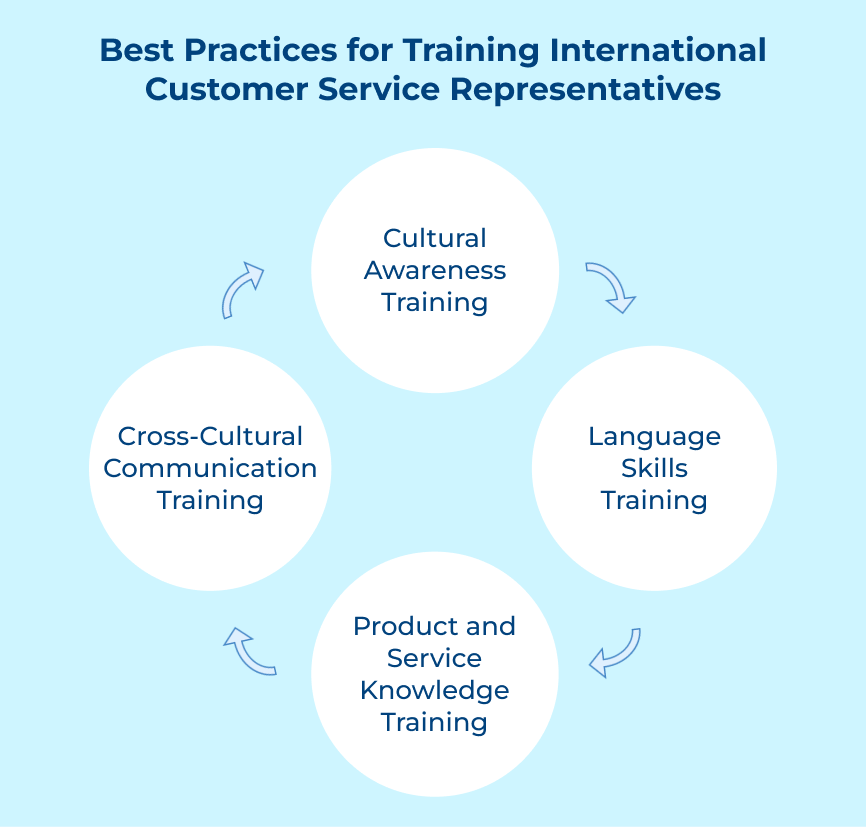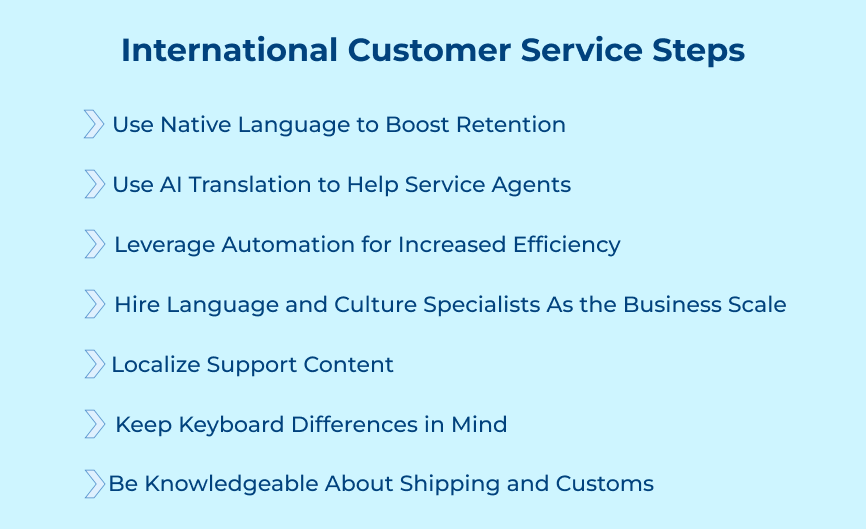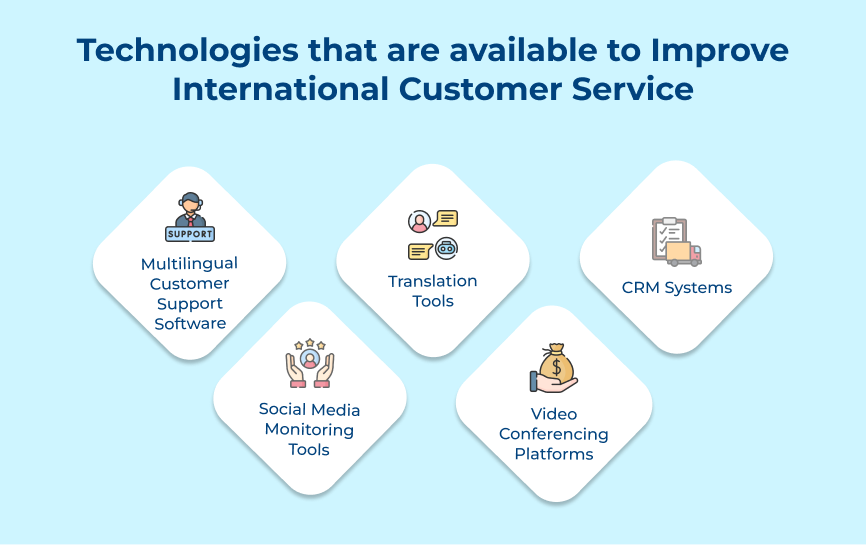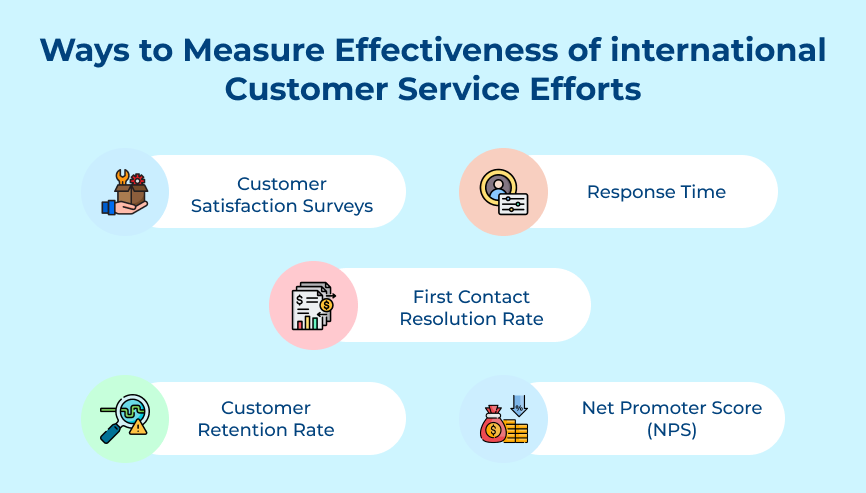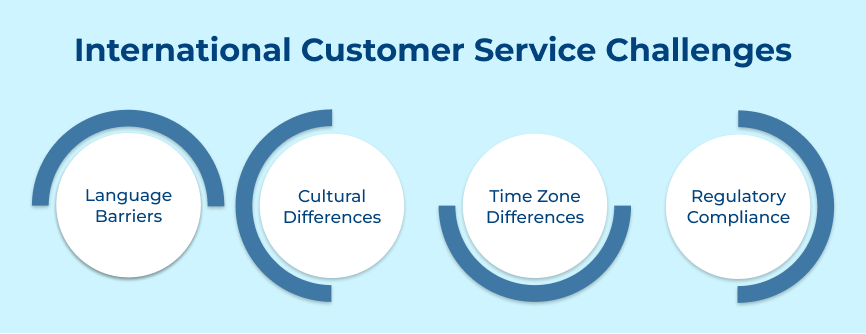1. Use Native Language to Boost Retention
One effective strategy to boost retention and provide excellent customer service internationally is by using the customer’s native language. Communicating with customers in their language of preference can help establish a stronger connection and enhance their experience. 73% of customers prefer reading product reviews in their native language.
Let’s imagine a global e-commerce company providing customer service in multiple languages to cater to its diverse customer base. Offering support in various languages, can effectively assist customers from different regions and improve their satisfaction.
Pro tips:
- Utilize translation tools or hire multilingual staff to ensure accurate and efficient communication.
- Train the customer service team to be culturally sensitive and understand the nuances of different languages.
- Personalize the customer experience by addressing them by their name and using culturally relevant phrases to show authenticity.
2. Use AI Translation to Help Service Agents
Providing international customer service is essential for businesses looking to attract and retain customers from around the world. One effective strategy to enhance customer service is to use AI translation. It helps service agents communicate with customers in their preferred language. The strategy is important because it helps break down language barriers and ensures that customers feel valued.
Service agents can quickly and accurately translate customer inquiries, leading to improved customer satisfaction by using AI translation tools. A use case for the strategy could be a multinational company with customers from various countries. Implementing AI translation for customer service can provide seamless support to customers in different languages. It leads to better customer experiences.
Pro tips:
- Choose a reliable AI translation tool that is accurate and user-friendly for service agents to use.
- Provide training to service agents on how to use the AI translation tool effectively and appropriately.
- Monitor and analyze customer feedback to continuously improve the use of AI translation in customer service interactions.
3. Leverage Automation for Increased Efficiency
Automating certain processes reduces manual workload and ensures a consistent level of service across different time zones. The chatbots can be programmed to answer common questions. They can provide information about offerings and even initiate transactions.
A use case for leveraging automation in international customer service could be a global e-commerce business. It receives orders from customers around the world. Implementing automated order processing and shipping notifications ensures timely delivery.
Pro tips:
- Regularly update the chatbots to ensure they provide accurate and relevant information.
- Use data analytics to track customer interactions and identify areas for improvement in the automated processes.
- Combine automation with personalized human interactions to offer a seamless and efficient customer experience.
4. Hire Language and Culture Specialists As the Business Scale
Providing international customer service becomes essential as businesses expand globally. Hiring language and culture specialists as the business scale is a key strategy to ensure effective communication. The specialists can bridge the gap between the company and foreign customers. It helps in providing a culturally sensitive experience.
A use case for the strategy could be a tech company expanding into the Asian market. Hiring language specialists in Mandarin, Japanese and Korean provides customer support in those regions. It leads to increased customer satisfaction.
Pro tips:
- Conduct thorough research to identify target markets and languages where specialist support is needed.
- Invest in language and cultural training for the customer service team to ensure they are equipped to handle international customer queries effectively.
- Collaborate with language and culture specialists to develop customer service strategies tailored to each market, taking into account cultural norms.
5. Localize Support Content
Localizing support content is a key strategy in providing international customer service. It includes adapting FAQs and troubleshooting guides to suit customer’s preferences in various regions. Localizing support content can help better connect with customers worldwide and improve their satisfaction.
Let’s assume that a global software company offers user guides in multiple languages. It helps customers worldwide with product information. It can help reduce language barriers and improve customer experience across different markets.
Pro tips:
- Work with native speakers who are familiar with the target market to ensure accurate translations and cultural relevance.
- Utilize localization software to streamline the process and maintain consistency in terminology.
- Regularly update localized content to reflect changes in products or services and address any customer feedback or issues.
6. Keep Keyboard Differences in Mind
When offering global customer service, it is crucial to consider keyboard variations for effective communication across regions. Different countries often have keyboards with varying layouts and characters. It is essential to understand how to accommodate the differences to provide a seamless customer experience.
One strategy is adapting brand communication to suit various keyboard layouts like QWERTY, AZERTY and QWERTZ in different regions. It is important to avoid using special characters or symbols that may not be accessible on all keyboards. It can lead to confusion or miscommunication.
Pro tips:
- Providing alternative ways for customers to input special characters, such as offering a dropdown menu with different language options.
- Using plain text formatting in communications to avoid display issues with certain characters.
- Offering language-specific keyboard shortcuts or instructions for customers to easily input special characters on their keyboards.
7. Be Knowledgeable About Shipping and Customs:
International customer service requires expertise in shipping and customs for customer satisfaction. Understanding the intricacies of international shipping regulations requirements can help avoid delays, additional costs and potential issues with delivery.
Understanding shipping and customs helps businesses provide customers with accurate shipping details. It boosts trust and enhances the shopping experience for international customers, aiding businesses.
Let’s consider an overseas customer order from an online store. Understanding shipping can assist in processing their order. It includes filling out customs forms and complying with regulations.
Pro tips:
- Stay up-to-date on international shipping regulations and customs requirements.
- Communicate clearly with customers about shipping times, fees and any additional requirements.
- Provide tracking information and updates to customers to keep them informed about the status of their orders.
What Technologies Are Available to Help Businesses Improve Their International Customer Service?
Let us go through the cutting-edge solutions that can help your business overcome international service challenges and ensure customer satisfaction across continents.






